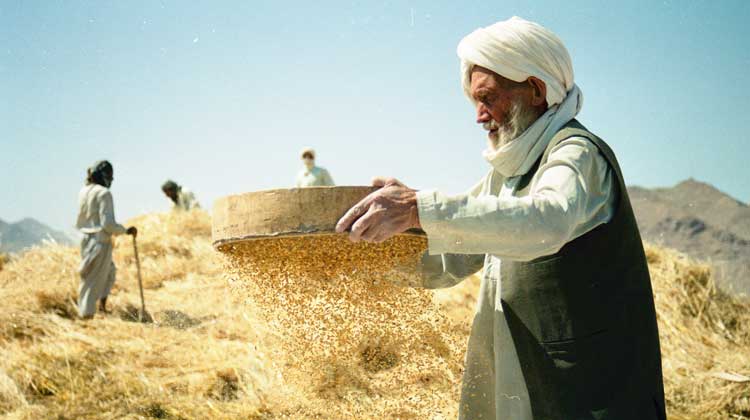
As the Unites States tries to break the long stalemate of war in Afghanistan, regional powers continue jockeying for position, attempting to carve out their own spheres of influence in the country.
A combination of fears over the Islamic State’s Afghanistan branch—Islamic State Khorasan Province (ISKP)—and prospects of mineral wealth have pulled more of Afghanistan’s neighbors into its diplomatic network. Iran and Russia have boosted support for the Taliban, while both China and Uzbekistan are pouring more money into trade with the Central Asian country.
China might be poised to be the next regional power broker after years of dominance from Pakistan. While sprinkling trillions of dollars across Eurasia in their Belt and Road Initiative, Afghanistan may soon pick up more of their investment.
“China is viewed as a more credible regional player,” said Michael Kugelman, senior associate for South Asia at the Wilson Center.
In 2015, China offered to mediate peace talks between the Taliban and the Afghan government. With the Chinese “all-weather friendship” with Pakistan, its interest in a stable Afghanistan only has grown.
Budding Diplomacy
Increased regional diplomacy comes at a time when the Unites States is working to jump-start peace talks with the Taliban. Through increased military pressure and direct outreach, the United States hopes to unglue the diplomatic love triangle that has dogged progress for years.
The Taliban demands to talk directly to the United States about a withdrawal of foreign troops from Afghanistan. The United States, until recently, has insisted that the Taliban talk directly with the Afghan government. And the Afghan government says it is ready to talk to the Taliban anywhere.
The White House recently instructed top U.S. diplomats to reach out directly to the Taliban to break the stalemate, The New York Times reported July 15.
“Even if the Taliban agree to talk, there is no reason to think there would be an agreement,” Kugelman said, “I remain skeptical about peace breaking out anytime soon.”
Gen. John Nicholson, the top commander officer of U.S. and NATO troops in Afghanistan, dismissed reports that the United States would be reaching out to the Taliban without the Afghan government.
“The Unites States is not a substitute for the Afghan government or the Afghan people,” he tweeted July 16.
Local Neighbors
Besides the major powers, smaller neighbors have a stake in Afghanistan’s peace and stability as well. Fears of ISKP continue to motivate support for the Taliban, as the two groups have clashed in the past. But Afghanistan hopes that increased trade and economic relationships will be more powerful than fear of roving insurgent groups.
“Security and economy are the two sides of the same coin,” said Fazulrahman Fazilyar, economic counselor at the Afghanistan embassy in Washington D.C.
Afghanistan’s neighbors want to protect their investments and ensure insurgents don’t spill over their borders, according to Fazilyar.
Uzbekistan, thawing from a long winter of post-Soviet isolation, has signed several agreements with Afghanistan to improve trade and diplomatic relations between the two countries. The agreements on reduced trade fees intend to bring the two countries closer together and leverage peace through economic activity.
Former Uzbekistan strongman Islam Karimov ruled with an iron grip and limited the country’s interactions with the outside world until his death two years ago. Now that the country with the largest population and economy in Central Asia is reforming, its attention is turning to Afghanistan.
On July 22, the controversial but revered first vice president of Afghanistan, Gen. Abdul Rashid Dostum returned to Kabul from exile in Turkey. Dostum is accused of sexual violence and human rights abuses. Many in Afghanistan’s northern Uzbek-dominated areas see Dostum—an ethnic Uzbek—as a strong leader. His supporters welcomed his return, while a suicide bomber attacked near his convoy as he left Kabul’s airport, killing as many as 20 and injuring 90, according to The New York Times.
“Uzbekistan has an important role to play in Afghanistan’s stability and future,” a state department spokesperson told Homeland411.
Fiery political rivalries among many of Afghanistan’s neighbors continue to thwart paths to local-led peace. Historically, Afghanistan has suffered for being the battlefield of the so-called “Great Game” Kugelman said. The British and Russian empires squeezed Afghanistan for the past two centuries, and their colonial remnants continue to impact the country.
Pakistan has played meddling big brother to Afghanistan for decades. The country that shares a long, porous border has loomed over Afghanistan’s internal affairs by supporting terror networks that destabilize the country.
“Pakistan is the paradise of terrorist groups,” Fazilyar said.
Religious Considerations
Competition also falls along ethnic and religious lines. Iran, the heartland for the minority Shia sect of Islam, supports Shia communities in Afghanistan.
More recently, Iran found strange bedfellows with the Taliban, a hardline Sunni group, that systematically killed many Shias during their regime in the late 1990s and other terror groups. In June, Iran helped the Taliban briefly re-claim the dusty, western provincial capital of Farah near the Iranian border.
Iran’s influence reaches over its borders to many countries across the Middle East in a quest for regional dominance, National Security Advisor John Bolton told Homeland411.
“Iran is the largest contributor to terrorist groups,” Bolton said in an interview earlier this month.
In the coming month, Afghanistan’s President Ashraf Ghani plans to pitch a second ceasefire with the Taliban to continue the push for peace talks, according to The Wall Street Journal. The second ceasefire comes after Afghans got a brief respite from fighting over the holiday of Eid-al-Fitr.
While the diplomatic landscape remains tricky, the economic potentials and continued threat from insurgent groups are starting to form a “convergence of interests,” among some of Afghanistan’s neighbors, Kugelman said.
“Peace is not a project,” Fazilyar added, “it is a process.”
Jackson Barnett is a staff writer for Homeland411
© 2018 Homeland411
Please subscribe to the free weekly Homeland411 electronic newsletter.